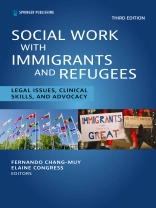Features practical applications covering the intersection of legal and social services
Using a foundational, institutional, and population-based approach illustrated with concrete examples, this innovative text will aid readers in the development of policy analysis skills, advocacy tools, and communication skills needed to work effectively with immigrants and refugees throughout the United States. The updated third edition includes four new chapters examining refugees and asylum, cultural humility and advocacy focused nonprofit organizations, public health and immigrants, and immigration and housing—areas that have recently seen extensive policy changes in practice and at the state and federal levels. Major updates throughout this solution-oriented text focus on how to enact positive systemic changes and include an extensive reorganization of the text to facilitate ease of use.
The text provides specific information about how to engage immigrant clients and how to help them navigate the complicated and often unwelcoming American educational, health, housing, and criminal justice systems. The book also addresses ways to advocate for immigrants and refugees in micro, mezzo, and macro settings and information on at-risk groups such as women, children, and elderly. Chapters feature learning objectives, case studies with discussion questions, and additional resources including sample documents. Instructors will also welcome a customizable sample syllabus and chapter Power Points.
New to the Third Edition:
- New chapters exploring refugees and asylum, cultural humility and advocacy focused nonprofit organizations, public health and immigrants, and immigration and housing
- Examines in depth how to enact positive systemic changes
- Provides an overview of immigration categories with a focus on highly vulnerable refugees and asylees
- Up-to-date immigration policy information
- Updates to federal government benefits and programs for immigrant workers
Key Features:
- Combines direct social service, systems change advocacy, and immigration strategies
- Integrates social work and immigration law, perspectives on health, mental health, education, employment, housing, and more
- Focuses on practical skills reinforced through case studies
- Examines the needs of specific at-risk immigrant population including refugees, women, children, and older adults
- Supports social work competencies essential for CSWE accreditation
Innehållsförteckning
Contributors
Foreword by Marciana Popescu
Foreword by Zeid bin Ra’ad bin Zeid al-Hussein
Preface
Acknowledgments
PART I. LAYING THE FOUNDATION OF SOCIAL WORK PRACTICE WITH IMMIGRANTS AND REFUGEES
Chapter 1. History of Migration in the United States
Chapter 2. Legal Classifications of Immigrants
Chapter 3. Refugees and Asylum: The Crucial Role of Service Providers
Chapter 4. Culturally Relevant, Anti-oppression Social Work Practice With Immigrant Populations
Chapter 5. Nonprofit Organization and Their Role in Integration and Resiliency
PART II. SYSTEMS AND INSTITUTIONS FOR IMMIGRANTS AND REFUGEES
Chapter 6. Public Health Perspectives With Immigrants and Refugees
Chapter 7. Mental Health Issues in Newcomer Communities
Chapter 8. Social Work and Physical Health Issues of Immigrants
Chapter 9. Overview of Immigrant Eligibility for Federal Programs
Chapter 10. The Intersection of Criminal and Immigration Law
Chapter 11. Immigrants and Employment
Chapter 12. Housing for Immigrant Clients
PART III. POPULATION-BASED IMMIGRANTS AND REFUGEES
Chapter 13. Immigrant Children and Education
Chapter 14. Women, Gender-Based Violence, and Immigration
Chapter 15. Social Work Practice With Older Immigrants
Index
Om författaren
Elaine Congress, DSW, MSW, is Professor and Associate Dean at the Fordham University Graduate School of Social Service. At the United Nations she represents three NGOs (Non-government Organizations), the International Federation of Social Workers (IFSW), the Institute of Multicultural Counseling and Education Services (IMCES), and Fordham University. Each year she oversees a group of Fordham graduate students at the United Nations. Dr. Congress is also a member of the executive committee of the NGO Committee on the Rights of Indigenous Peoples, is Vice-chair of the NGO Committee on Mental Health and is active on the NGO Committee on Migration and the Committee on the Status of Women. She has served as the North American representative on the IFSW’s Permanent Committee on Ethical Issues.












